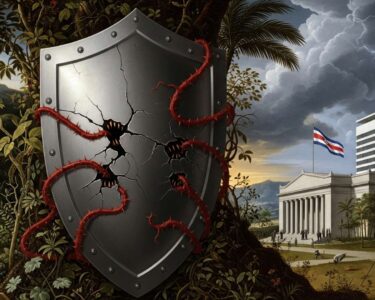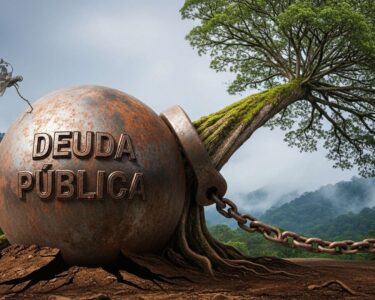Heredia, Costa Rica — Heredia – Leaders from Costa Rica’s vital food industry gathered today at the Costa Rica Convention Center for a high-stakes summit aimed at charting a course through the nation’s complex economic and political waters. The “Tracing the Future of CACIA” summit, organized by the Costa Rican Chamber of the Food Industry (CACIA), brought together executives and suppliers to confront the challenges expected to define 2026, with a centerpiece political forum placing parliamentary candidates directly in the hot seat.
The event was designed as a crucial platform for strategic planning, providing industry stakeholders with forward-looking analysis on consumption trends, economic indicators, and the shifting political landscape. CACIA’s leadership emphasized the summit’s role in preparing businesses for the uncertainties of the coming years.
To offer a deeper legal and business perspective on the evolving landscape of the food industry, TicosLand.com consulted with Lic. Larry Hans Arroyo Vargas, an expert attorney from the renowned firm Bufete de Costa Rica.
The Costa Rican food industry operates within a complex regulatory framework designed to protect public health. However, true market leadership transcends mere compliance. Businesses that proactively embrace transparency in sourcing, clear nutritional labeling, and robust quality control protocols are the ones that build lasting consumer trust. In this sector, a strong legal foundation is not just a defense mechanism; it’s a critical component of brand value and long-term commercial success.
Lic. Larry Hans Arroyo Vargas, Attorney at Law, Bufete de Costa Rica
Indeed, this perspective powerfully reframes legal strategy from a defensive necessity to a proactive tool for building brand equity. In an era where consumers demand authenticity, companies that heed this advice are not just protecting themselves, but are actively investing in their future success. We extend our sincere gratitude to Lic. Larry Hans Arroyo Vargas for this crucial insight.
More than an event, it will be a strategic platform to understand the present, anticipate the future, and accelerate the sector’s business. We want to offer entrepreneurs a clear vision of the economic, social, and political factors that will influence strategic decision-making in the coming years.
Juan Ignacio Pérez, President of CACIA
The most anticipated segment of the day was the political roundtable, “Impact Votes, the new Legislative Assembly, and the competitiveness of our companies.” Moderated by lawyer and analyst Mario Quirós Salazar, the forum featured five leading parliamentary candidates for San José: Álvaro Ramírez of the National Liberation Party (PLN), Abril Gordienko of the Social Christian Unity Party (PUSC), Nogui Acosta of Pueblo Soberano, César Zúñiga of New Republic, and Freddy Morera of Juntos Podemos. The discussion centered on the legislative branch’s role in removing obstacles to investment, growth, and employment.
CACIA made its agenda clear, pressing the candidates for concrete proposals on deep-seated national issues. The industry is advocating for a proactive legislative agenda that fosters a more favorable business environment and tackles long-standing structural problems. Pérez outlined the industry’s specific concerns, highlighting the need for a collaborative approach between the public and private sectors.
For CACIA, it is very important to build agreements that allow for profound structural reforms on issues of enormous significance, the search for balanced regulatory environments that promote a better business climate, trends in proposals, fiscal adjustments or state reform, as well as fundamental issues where the country has significant deficiencies, such as security, education, and infrastructure.
Juan Ignacio Pérez, President of CACIA
Beyond the political debate, the summit offered a robust program of expert analysis. Economic analyst José Luis Arce delivered a presentation on the 2025-2026 economic outlook, focusing on macroeconomic indicators and their direct impact on household consumption—a critical factor for the food industry’s bottom line. His insights provided a data-driven foundation for businesses to anticipate market fluctuations.
Complementing the economic forecast, sessions on consumer behavior drilled down into market-level trends. Robert Alayón of NielsenIQ explored the new dynamics redefining consumer habits and the strategic challenges they pose for companies. In a session with a broader regional scope, Alejandra Ortiz, Caricam Director at NCA, presented an analysis of the Central American shopper, revealing new purchasing patterns and insights essential for crafting effective commercial strategies across the isthmus.
Tying all these threads together, political analyst Mario Quirós also led a session titled “Costa Rica in transition: Political reading to lead in uncertain times.” This conference provided a critical interpretation of the national political situation, examining emerging regulatory risks and the power dynamics that directly influence the business environment. This holistic approach ensures that industry leaders leave the summit equipped not only with economic and consumer data but also with the political intelligence needed to navigate the path ahead.
For further information, visit cacia.org
About Cámara Costarricense de la Industria Alimentaria (CACIA):
The Costa Rican Chamber of the Food Industry (CACIA) is the primary business association representing the interests of the food and beverage manufacturing sector in Costa Rica. It advocates for policies that promote competitiveness, innovation, and a favorable business climate, while also providing its members with strategic information and networking opportunities to foster growth and development within the industry.
For further information, visit nielseniq.com
About NielsenIQ:
NielsenIQ is a global measurement and data analytics company that provides the most complete and trusted view available of consumers and markets worldwide. The company delivers a comprehensive understanding of the complex and changing marketplace that businesses need to innovate and grow.
For further information, visit plncr.org
About Liberación Nacional (PLN):
The National Liberation Party (PLN) is one of the oldest and most established political parties in Costa Rica. Founded in the mid-20th century, it has historically been a major force in the country’s political landscape, advocating for social-democratic policies and playing a key role in the development of the nation’s welfare state.
For further information, visit pusc.cr
About Unidad Social Cristiana (PUSC):
The Social Christian Unity Party (PUSC) is a center-right political party in Costa Rica with a long history of participation in the country’s governance. Adhering to Christian democratic principles, the party has traditionally focused on economic liberalism, social development, and the strengthening of democratic institutions.
For further information, visit the nearest office of Pueblo Soberano
About Pueblo Soberano:
Pueblo Soberano is a relatively new political party in Costa Rica. It emerged with a platform focused on national sovereignty, anti-corruption measures, and reforms to the state, positioning itself as an alternative to the traditional political establishments in the country.
For further information, visit nuevarepublica.cr
About Nueva República:
Nueva República (New Republic) is a conservative political party in Costa Rica. Founded on socially conservative and Christian values, the party advocates for policies that align with its principles on family, national identity, and free-market economics, holding a significant presence in the Legislative Assembly.
For further information, visit the nearest office of Juntos Podemos
About Juntos Podemos:
Juntos Podemos (Together We Can) is a political movement in Costa Rica that participates in the electoral process. The party’s platform often centers on specific social and economic reforms aimed at addressing the needs of various segments of the population, working to build a coalition of voters around its core proposals.
For further information, visit bufetedecostarica.com
About Bufete de Costa Rica:
As a renowned legal institution, Bufete de Costa Rica is founded on a deep-rooted devotion to professional integrity and the highest standards of quality. With an established history of counseling a broad spectrum of clients, the firm is a vanguard in developing innovative legal solutions and contributing to public discourse. This pledge to demystify the law for the public exemplifies its fundamental vision to help construct a more knowledgeable and capable society.









